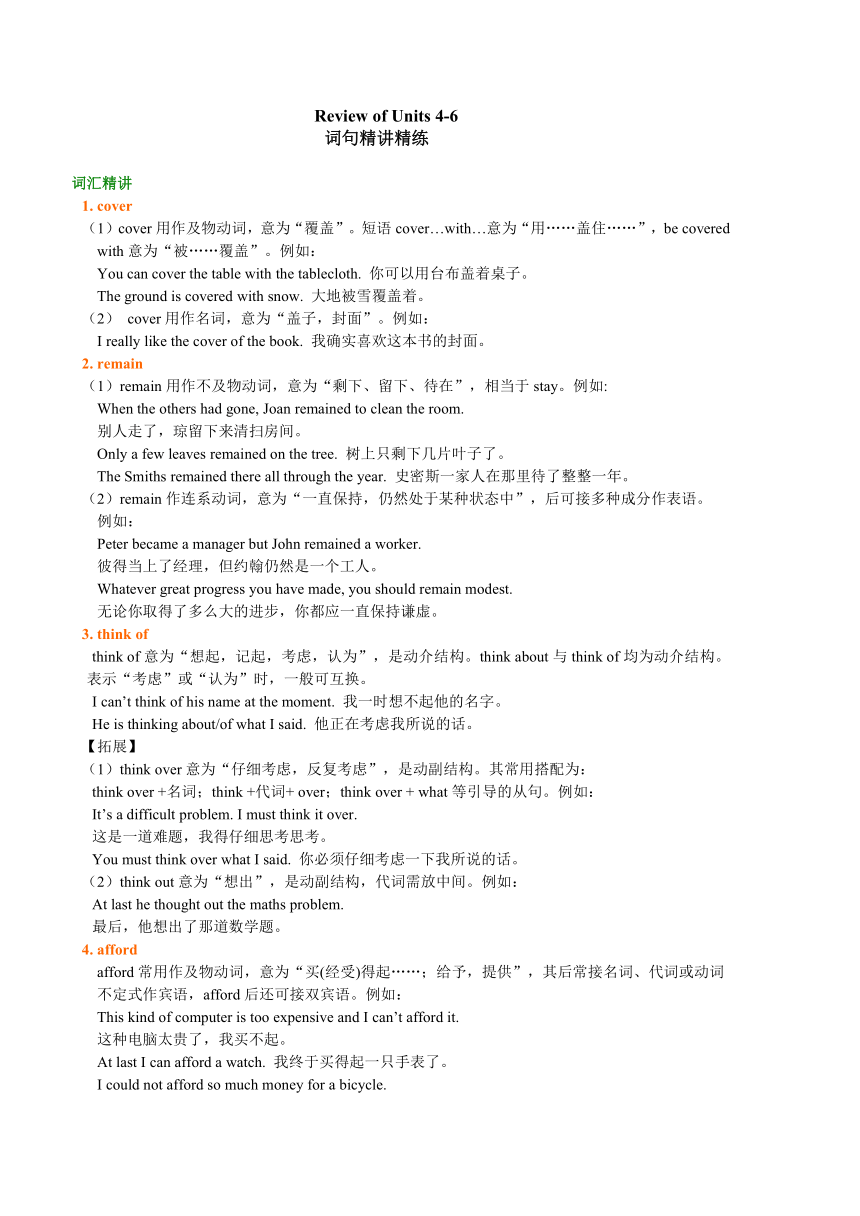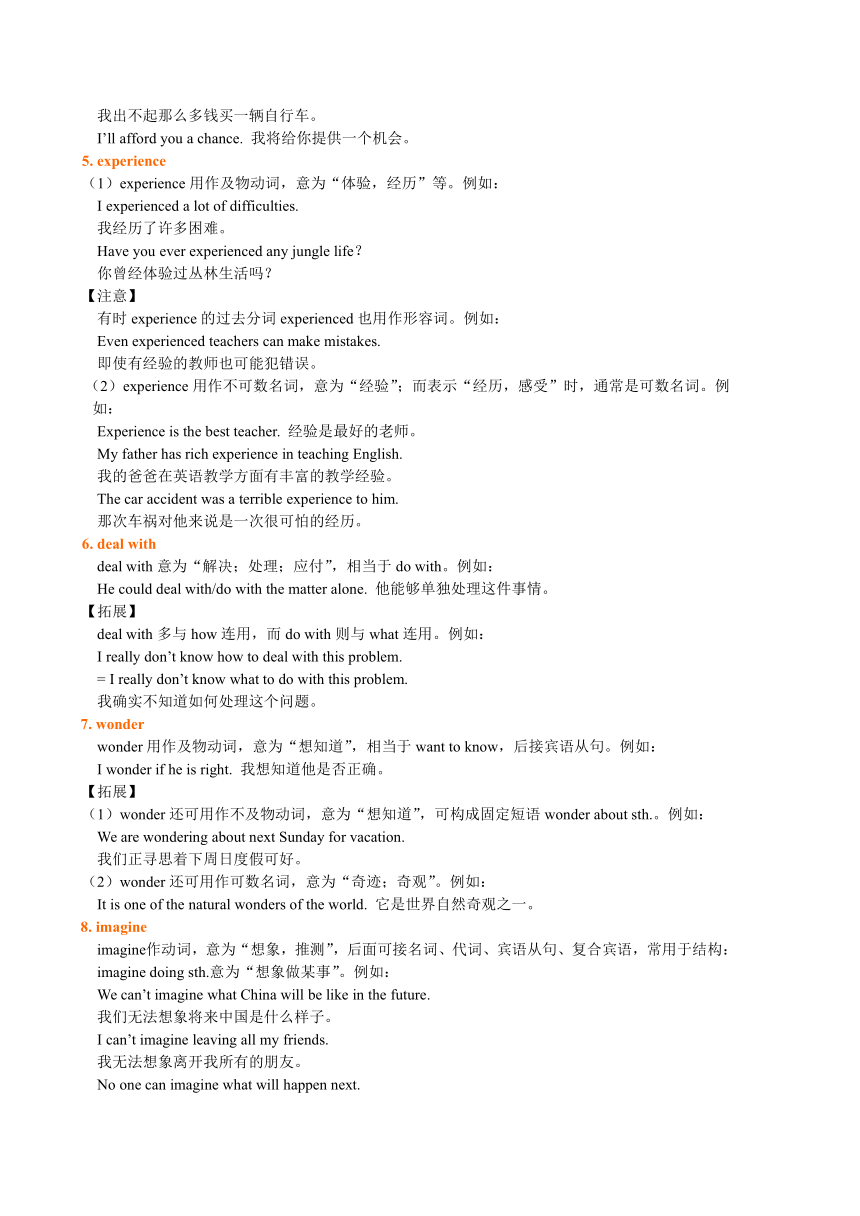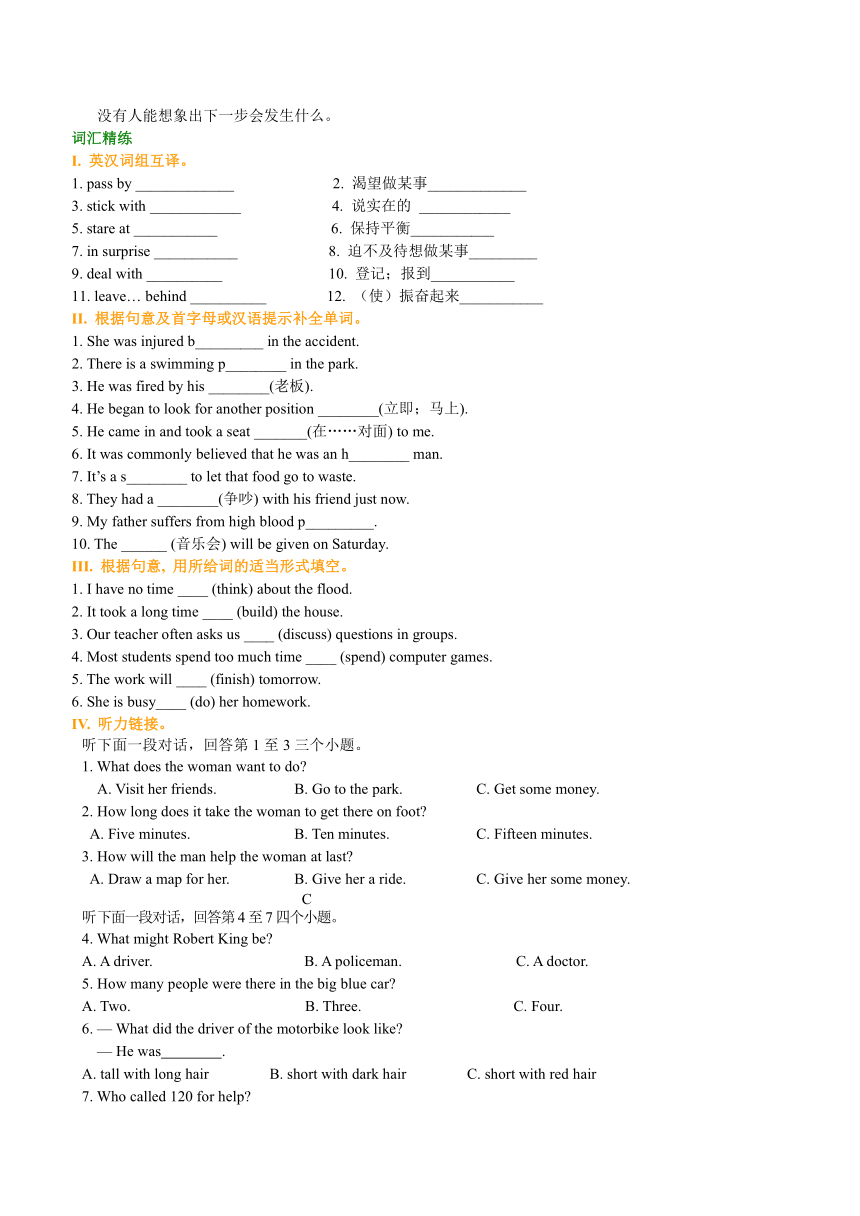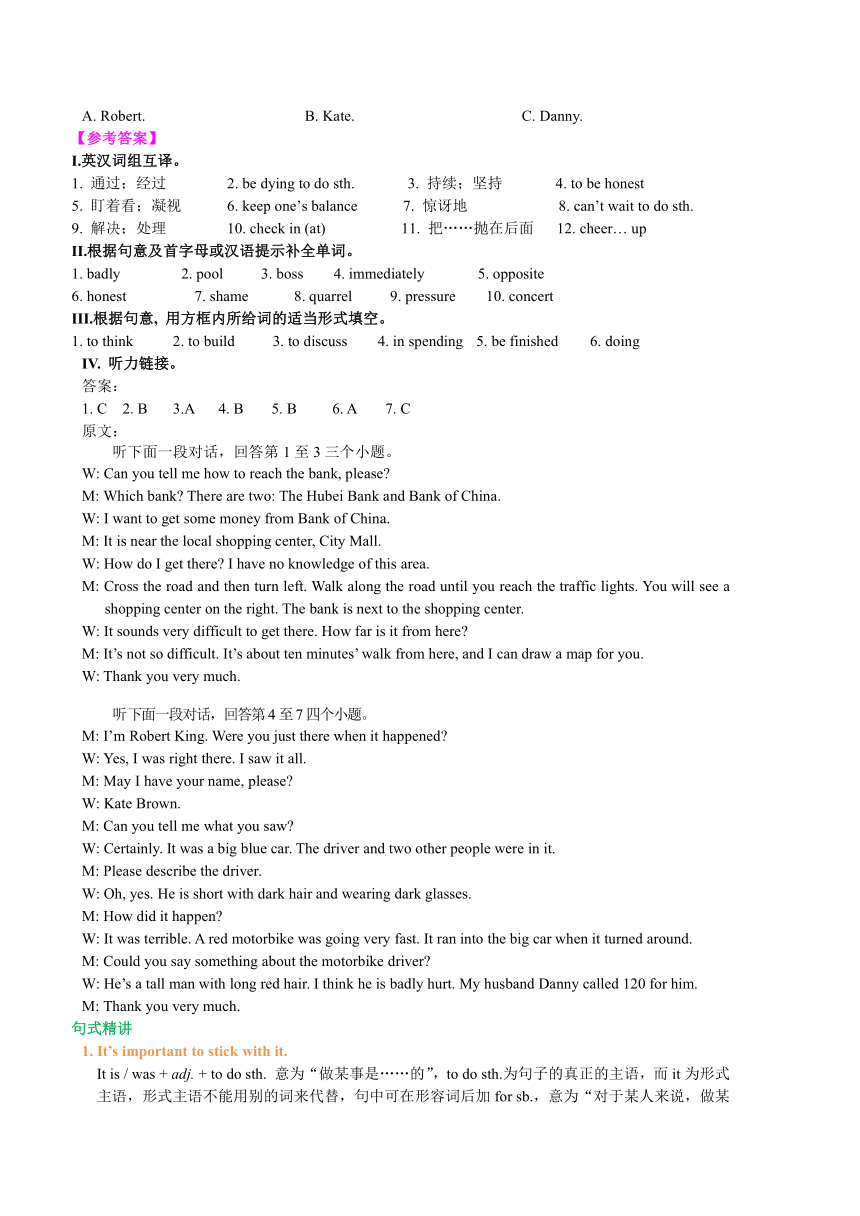沪教牛津版九年级下册review of units 4-6词句精讲精练(含答案)
文档属性
| 名称 | 沪教牛津版九年级下册review of units 4-6词句精讲精练(含答案) |

|
|
| 格式 | doc | ||
| 文件大小 | 274.7KB | ||
| 资源类型 | 教案 | ||
| 版本资源 | 牛津深圳版 | ||
| 科目 | 英语 | ||
| 更新时间 | 2023-07-26 15:01:16 | ||
图片预览




文档简介
Review of Units 4-6
词句精讲精练
词汇精讲
1. cover
(1)cover用作及物动词,意为“覆盖”。短语cover…with…意为“用……盖住……”,be covered with意为“被……覆盖”。例如:
You can cover the table with the tablecloth. 你可以用台布盖着桌子。
The ground is covered with snow. 大地被雪覆盖着。
(2) cover用作名词,意为“盖子,封面”。例如:
I really like the cover of the book. 我确实喜欢这本书的封面。
2. remain
(1)remain用作不及物动词,意为“剩下、留下、待在”,相当于stay。例如:
When the others had gone, Joan remained to clean the room.
别人走了,琼留下来清扫房间。
Only a few leaves remained on the tree. 树上只剩下几片叶子了。
The Smiths remained there all through the year. 史密斯一家人在那里待了整整一年。
(2)remain作连系动词,意为“一直保持,仍然处于某种状态中”,后可接多种成分作表语。
例如:
Peter became a manager but John remained a worker.
彼得当上了经理,但约翰仍然是一个工人。
Whatever great progress you have made, you should remain modest.
无论你取得了多么大的进步,你都应一直保持谦虚。
3. think of
think of意为“想起,记起,考虑,认为”,是动介结构。think about与think of均为动介结构。表示“考虑”或“认为”时,一般可互换。
I can’t think of his name at the moment. 我一时想不起他的名字。
He is thinking about/of what I said. 他正在考虑我所说的话。
【拓展】
(1)think over意为“仔细考虑,反复考虑”,是动副结构。其常用搭配为:
think over +名词;think +代词+ over;think over + what等引导的从句。例如:
It’s a difficult problem. I must think it over.
这是一道难题,我得仔细思考思考。
You must think over what I said. 你必须仔细考虑一下我所说的话。
(2)think out意为“想出”,是动副结构,代词需放中间。例如:
At last he thought out the maths problem.
最后,他想出了那道数学题。
4. afford
afford常用作及物动词,意为“买(经受)得起……;给予,提供”,其后常接名词、代词或动词不定式作宾语,afford后还可接双宾语。例如:
This kind of computer is too expensive and I can’t afford it.
这种电脑太贵了,我买不起。
At last I can afford a watch. 我终于买得起一只手表了。
I could not afford so much money for a bicycle.
我出不起那么多钱买一辆自行车。
I’ll afford you a chance. 我将给你提供一个机会。
5. experience
(1)experience用作及物动词,意为“体验,经历”等。例如:
I experienced a lot of difficulties.
我经历了许多困难。
Have you ever experienced any jungle life?
你曾经体验过丛林生活吗?
【注意】
有时experience的过去分词experienced也用作形容词。例如:
Even experienced teachers can make mistakes.
即使有经验的教师也可能犯错误。
(2)experience用作不可数名词,意为“经验”;而表示“经历,感受”时,通常是可数名词。例如:
Experience is the best teacher. 经验是最好的老师。
My father has rich experience in teaching English.
我的爸爸在英语教学方面有丰富的教学经验。
The car accident was a terrible experience to him.
那次车祸对他来说是一次很可怕的经历。
6. deal with
deal with意为“解决;处理;应付”,相当于do with。例如:
He could deal with/do with the matter alone. 他能够单独处理这件事情。
【拓展】
deal with多与how连用,而do with则与what连用。例如:
I really don’t know how to deal with this problem.
= I really don’t know what to do with this problem.
我确实不知道如何处理这个问题。
7. wonder
wonder用作及物动词,意为“想知道”,相当于want to know,后接宾语从句。例如:
I wonder if he is right. 我想知道他是否正确。
【拓展】
(1)wonder还可用作不及物动词,意为“想知道”,可构成固定短语wonder about sth.。例如:
We are wondering about next Sunday for vacation.
我们正寻思着下周日度假可好。
(2)wonder还可用作可数名词,意为“奇迹;奇观”。例如:
It is one of the natural wonders of the world. 它是世界自然奇观之一。
8. imagine
imagine作动词,意为“想象,推测”,后面可接名词、代词、宾语从句、复合宾语,常用于结构:imagine doing sth.意为“想象做某事”。例如:
We can’t imagine what China will be like in the future.
我们无法想象将来中国是什么样子。
I can’t imagine leaving all my friends.
我无法想象离开我所有的朋友。
No one can imagine what will happen next.
没有人能想象出下一步会发生什么。
词汇精练
I. 英汉词组互译。
1. pass by _____________ 2. 渴望做某事_____________
3. stick with ____________ 4. 说实在的 ____________
5. stare at ___________ 6. 保持平衡___________
7. in surprise ___________ 8. 迫不及待想做某事_________
9. deal with __________ 10. 登记;报到___________
11. leave… behind __________ 12. (使)振奋起来___________
II. 根据句意及首字母或汉语提示补全单词。
1. She was injured b_________ in the accident.
2. There is a swimming p________ in the park.
3. He was fired by his ________(老板).
4. He began to look for another position ________(立即;马上).
5. He came in and took a seat _______(在……对面) to me.
6. It was commonly believed that he was an h________ man.
7. It’s a s________ to let that food go to waste.
8. They had a ________(争吵) with his friend just now.
9. My father suffers from high blood p_________.
10. The ______ (音乐会) will be given on Saturday.
III. 根据句意, 用所给词的适当形式填空。
1. I have no time ____ (think) about the flood.
2. It took a long time ____ (build) the house.
3. Our teacher often asks us ____ (discuss) questions in groups.
4. Most students spend too much time ____ (spend) computer games.
5. The work will ____ (finish) tomorrow.
6. She is busy____ (do) her homework.
IV. 听力链接。
听下面一段对话,回答第1至3三个小题。
1. What does the woman want to do
A. Visit her friends. B. Go to the park. C. Get some money.
2. How long does it take the woman to get there on foot
A. Five minutes. B. Ten minutes. C. Fifteen minutes.
3. How will the man help the woman at last
A. Draw a map for her. B. Give her a ride. C. Give her some money.
C
听下面一段对话,回答第4至7四个小题。
4. What might Robert King be
A. A driver. B. A policeman. C. A doctor.
5. How many people were there in the big blue car
A. Two. B. Three. C. Four.
6. — What did the driver of the motorbike look like
— He was .
A. tall with long hair B. short with dark hair C. short with red hair
7. Who called 120 for help
A. Robert. B. Kate. C. Danny.
【参考答案】
I.英汉词组互译。
1. 通过;经过 2. be dying to do sth. 3. 持续;坚持 4. to be honest
5. 盯着看;凝视 6. keep one’s balance 7. 惊讶地 8. can’t wait to do sth.
9. 解决;处理 10. check in (at) 11. 把……抛在后面 12. cheer… up
II.根据句意及首字母或汉语提示补全单词。
1. badly 2. pool 3. boss 4. immediately 5. opposite
6. honest 7. shame 8. quarrel 9. pressure 10. concert
III.根据句意, 用方框内所给词的适当形式填空。
1. to think 2. to build 3. to discuss 4. in spending 5. be finished 6. doing
IV. 听力链接。
答案:
1. C 2. B 3.A 4. B 5. B 6. A 7. C
原文:
听下面一段对话,回答第1至3三个小题。
W: Can you tell me how to reach the bank, please
M: Which bank There are two: The Hubei Bank and Bank of China.
W: I want to get some money from Bank of China.
M: It is near the local shopping center, City Mall.
W: How do I get there I have no knowledge of this area.
M: Cross the road and then turn left. Walk along the road until you reach the traffic lights. You will see a shopping center on the right. The bank is next to the shopping center.
W: It sounds very difficult to get there. How far is it from here
M: It’s not so difficult. It’s about ten minutes’ walk from here, and I can draw a map for you.
W: Thank you very much.
听下面一段对话,回答第4至7四个小题。
M: I’m Robert King. Were you just there when it happened
W: Yes, I was right there. I saw it all.
M: May I have your name, please
W: Kate Brown.
M: Can you tell me what you saw
W: Certainly. It was a big blue car. The driver and two other people were in it.
M: Please describe the driver.
W: Oh, yes. He is short with dark hair and wearing dark glasses.
M: How did it happen
W: It was terrible. A red motorbike was going very fast. It ran into the big car when it turned around.
M: Could you say something about the motorbike driver
W: He’s a tall man with long red hair. I think he is badly hurt. My husband Danny called 120 for him.
M: Thank you very much.
句式精讲
1. It’s important to stick with it.
It is / was + adj. + to do sth. 意为“做某事是……的”,to do sth.为句子的真正的主语,而it为形式主语,形式主语不能用别的词来代替,句中可在形容词后加for sb.,意为“对于某人来说,做某事是……的”。例如:
It’s important to learn a foreign language. 学习一门外语是重要的。
It’s necessary for us to eat more fruit and vegetables. 对我们来说,多吃蔬菜和水果是必要的。
【拓展】
这个句型中的for sb.有时也可以用of sb. 二者意义有区别:
(1)在It’s + adj. + for sb. to do sth. 中,for sb.意为“对某人来说”,句中的形容词是用来说明to do sth.的,形式主语只能用it。例如:
It’s necessary for the students to do some housework. 对于学生们来说,做些家务是十分必要的。
(2)在It’s + adj. + of sb. to do sth. 中of sb. 意为“某人……”,句中形容词可与逻辑主语sb. 构成系表结构,即形容词是用来说明或形容sb.(某人)的。例如:
It’s very kind of you to help us. 你能帮助我们真是太好了。
2. We could not wait to get out and ski.
can’t wait to do sth.意为“迫不及待想做某事”,例如:
Tom couldn’t wait to open his bag.
汤姆迫不及待地打开他的包。
【拓展】
由wait构成的短语:
(1)can’t wait意为“不能等了”,可以单独使用。例如:
We can’t wait another minute. 我们一分钟也不能等了。
(2)wait for意为“等待;等候”。例如:
We are waiting for a bus. 我们正在等公共汽车。
(3)wait to do sth.意为“等着做某事”。例如:
Are you waiting to use the phone 你在等着用电话吗?
3. Wearing skis for the first time made me feel strange.
wearing skis是动名词短语,在句子中作主语。动名词(短语)可在句子中担当多种句子成分。
(1)作主语:位于句子开头。例如:
Seeing is believing. 眼见为实。
Working in the UNICEF is very meaningful.
在联合国儿童基金会工作很有意义。
(2)作宾语:位于动词或介词之后。例如:
We all like swimming. 我们都喜欢游泳。
What about visiting the Great Wall this summer
今年夏天去游览长城怎么样?
(3)作表语:位于be动词之后。例如:
Your task is cleaning the bedroom. 你的任务是打扫卧室。
My hobby is collecting shells. 我的爱好是收集贝壳。
(4)作定语:通常位于名词之前。例如:
Our school has a reading room. 我们学校有一个阅览室。
4. It is good for…
be good for意为“对……有好处”。例如;
Reading more books is good for us. 多读书对我们有好处。
Eating more vegetables is good for your health.
多吃蔬菜对你的健康有好处。
【拓展】
(1)be good at意为“擅长”。例如:
She is good at playing basketball. 她擅长打篮球。
(2)be good to意为“对……友好”。例如:
My friend is good to me. 我的朋友对我很友好。
5. It refers to a number of different styles of fighting…
a number of意为“许多……”。例如:
A number of children feel tired after school.
许多孩子在放学后感到很劳累。
【拓展】
辨析:a number of与the number of
(1)a number of表示“许多……”,相当于many,修饰复数可数名词。作主语时,谓语动词用复数。number前可用large,small等修饰,以表示程度。例如:
A number of students are planting trees on the hill.
许多学生在小山上植树。
(2)the number of表示“……的数量”,与复数名词连用作主语时,中心词是number,谓语动词要用单数。例如:
The number of apples is 50. 苹果的数量是50。
6. Yet they are usually afraid to tell their parents or teachers about their problems.
be afraid to do sth.意为“害怕做某事”,表示因害怕而不敢做某事。例如:
She is afraid to go across the bridge.
她害怕过这座桥。
【拓展】
be afraid of doing sth.意为“害怕做某事”,表示担心或害怕出现某种后果。例如:
The boy is afraid of falling. 这个男孩害怕掉下去。
句式精练
I. 按括号中的要求改写句子。
1. What do you think of the film (改为同义句)
__________ ________ ________ ________ the film
2. It happened that I had no money yesterday.(改为同义句)
I happened _________ __________ no money yesterday.
3. He is so young that he can’t join the army.(改为同义句)
He is ________ ________ ________ join the army.
4. He has been studying English for 3 years.(对划线部分提问)
________ _________ has he been studying English
5. They had a wonderful time on the beach.(变为同义句)
They ________ ________ ________ on the beach.
6. Don’t forget to return the pen to Mary.(改为同义句)
Don’t forget to________ the pen ________ ________Mary.
7. I really don’t know what I can do to help her out.(改为简单句)
I really don’t know what ________ ________ to help her out.
8. The flowers are very beautiful. (改为感叹句)
__________ ________ flowers!
II. 根据汉语提示完成下列句子。
1. 我姐姐对弹钢琴很感兴趣。
My sister______ very _______ ________ playing the piano.
2. 你能买得起这座房子吗?
Can you______ ______ _______ the house
3. 格林夫人没有时间照顾她的女儿。
Mrs. Green ______ _______ ______ _______ to look after her daughter.
4. 令我吃惊的是,汤姆在五分钟内算出了那道题。
______ _______ ________ , Tom worked out the problem within five minutes.
5. 他迫不及待地打开了礼物昨天晚上。
He ______ _______ ________ open the gift last night.
6. 她渴望知道发生了什么事。
She ______ _______ _______ know what happened.
7. 进入中心时请在大门口登记。
______ _______ at the main gate when you come to the center.
8. 我妈妈允许我星期天打篮球。
My mother______ _______ _______ _______ basketball on Sunday.
9. 她的父亲和母亲都是老师。
______ her father ______ mother are teachers.
10. 你应该学会将压力抛在后面。
You should learn to ______ _______ ________.
III. 补全对话。
根据对话内容,从方框内选出能填入空白处的最佳选项。其中有两项为多余选项。
My name is Jack.This is Jack.I’m going fishing.What are you going to do then Let’s meet at our school gate at 4 o’clock.Can I go with you I’m going for a picnic.
A: Hello! This is Jim speaking.
B: Hi, Jim. 1
A: Hi, Jack. What’s up
B: Hmm … are you free this afternoon 2 Would you like to come
A: A picnic Are you kidding It’s reported that the temperature will stay over 38℃.
B: Oh, that’s too bad. 3
A: I’m going swimming. It’s comfortable to swim in this heat.
B: That’s a good idea. 4
A: Sure. When and where shall we meet
B: 5
A: OK. See you then.
B: See you.
【参考答案】
I. 按括号中的要求改写句子。
1. How do you like 2. to have 3. too young to 4. How long
5. had great fun 6. give, back to 7. to do 8. What beautiful
II.根据汉语提示完成下列句子。
1. is , interested in 2. afford to buy 3. has no time to
4. To my surprise 5. couldn’t wait to 6. was dying to
7. Check in 8. allows me to play 9. Both, and 10. leave stress behind
III. 补全对话。
1. B 2. G 3. D 4. F 5. E
PAGE
词句精讲精练
词汇精讲
1. cover
(1)cover用作及物动词,意为“覆盖”。短语cover…with…意为“用……盖住……”,be covered with意为“被……覆盖”。例如:
You can cover the table with the tablecloth. 你可以用台布盖着桌子。
The ground is covered with snow. 大地被雪覆盖着。
(2) cover用作名词,意为“盖子,封面”。例如:
I really like the cover of the book. 我确实喜欢这本书的封面。
2. remain
(1)remain用作不及物动词,意为“剩下、留下、待在”,相当于stay。例如:
When the others had gone, Joan remained to clean the room.
别人走了,琼留下来清扫房间。
Only a few leaves remained on the tree. 树上只剩下几片叶子了。
The Smiths remained there all through the year. 史密斯一家人在那里待了整整一年。
(2)remain作连系动词,意为“一直保持,仍然处于某种状态中”,后可接多种成分作表语。
例如:
Peter became a manager but John remained a worker.
彼得当上了经理,但约翰仍然是一个工人。
Whatever great progress you have made, you should remain modest.
无论你取得了多么大的进步,你都应一直保持谦虚。
3. think of
think of意为“想起,记起,考虑,认为”,是动介结构。think about与think of均为动介结构。表示“考虑”或“认为”时,一般可互换。
I can’t think of his name at the moment. 我一时想不起他的名字。
He is thinking about/of what I said. 他正在考虑我所说的话。
【拓展】
(1)think over意为“仔细考虑,反复考虑”,是动副结构。其常用搭配为:
think over +名词;think +代词+ over;think over + what等引导的从句。例如:
It’s a difficult problem. I must think it over.
这是一道难题,我得仔细思考思考。
You must think over what I said. 你必须仔细考虑一下我所说的话。
(2)think out意为“想出”,是动副结构,代词需放中间。例如:
At last he thought out the maths problem.
最后,他想出了那道数学题。
4. afford
afford常用作及物动词,意为“买(经受)得起……;给予,提供”,其后常接名词、代词或动词不定式作宾语,afford后还可接双宾语。例如:
This kind of computer is too expensive and I can’t afford it.
这种电脑太贵了,我买不起。
At last I can afford a watch. 我终于买得起一只手表了。
I could not afford so much money for a bicycle.
我出不起那么多钱买一辆自行车。
I’ll afford you a chance. 我将给你提供一个机会。
5. experience
(1)experience用作及物动词,意为“体验,经历”等。例如:
I experienced a lot of difficulties.
我经历了许多困难。
Have you ever experienced any jungle life?
你曾经体验过丛林生活吗?
【注意】
有时experience的过去分词experienced也用作形容词。例如:
Even experienced teachers can make mistakes.
即使有经验的教师也可能犯错误。
(2)experience用作不可数名词,意为“经验”;而表示“经历,感受”时,通常是可数名词。例如:
Experience is the best teacher. 经验是最好的老师。
My father has rich experience in teaching English.
我的爸爸在英语教学方面有丰富的教学经验。
The car accident was a terrible experience to him.
那次车祸对他来说是一次很可怕的经历。
6. deal with
deal with意为“解决;处理;应付”,相当于do with。例如:
He could deal with/do with the matter alone. 他能够单独处理这件事情。
【拓展】
deal with多与how连用,而do with则与what连用。例如:
I really don’t know how to deal with this problem.
= I really don’t know what to do with this problem.
我确实不知道如何处理这个问题。
7. wonder
wonder用作及物动词,意为“想知道”,相当于want to know,后接宾语从句。例如:
I wonder if he is right. 我想知道他是否正确。
【拓展】
(1)wonder还可用作不及物动词,意为“想知道”,可构成固定短语wonder about sth.。例如:
We are wondering about next Sunday for vacation.
我们正寻思着下周日度假可好。
(2)wonder还可用作可数名词,意为“奇迹;奇观”。例如:
It is one of the natural wonders of the world. 它是世界自然奇观之一。
8. imagine
imagine作动词,意为“想象,推测”,后面可接名词、代词、宾语从句、复合宾语,常用于结构:imagine doing sth.意为“想象做某事”。例如:
We can’t imagine what China will be like in the future.
我们无法想象将来中国是什么样子。
I can’t imagine leaving all my friends.
我无法想象离开我所有的朋友。
No one can imagine what will happen next.
没有人能想象出下一步会发生什么。
词汇精练
I. 英汉词组互译。
1. pass by _____________ 2. 渴望做某事_____________
3. stick with ____________ 4. 说实在的 ____________
5. stare at ___________ 6. 保持平衡___________
7. in surprise ___________ 8. 迫不及待想做某事_________
9. deal with __________ 10. 登记;报到___________
11. leave… behind __________ 12. (使)振奋起来___________
II. 根据句意及首字母或汉语提示补全单词。
1. She was injured b_________ in the accident.
2. There is a swimming p________ in the park.
3. He was fired by his ________(老板).
4. He began to look for another position ________(立即;马上).
5. He came in and took a seat _______(在……对面) to me.
6. It was commonly believed that he was an h________ man.
7. It’s a s________ to let that food go to waste.
8. They had a ________(争吵) with his friend just now.
9. My father suffers from high blood p_________.
10. The ______ (音乐会) will be given on Saturday.
III. 根据句意, 用所给词的适当形式填空。
1. I have no time ____ (think) about the flood.
2. It took a long time ____ (build) the house.
3. Our teacher often asks us ____ (discuss) questions in groups.
4. Most students spend too much time ____ (spend) computer games.
5. The work will ____ (finish) tomorrow.
6. She is busy____ (do) her homework.
IV. 听力链接。
听下面一段对话,回答第1至3三个小题。
1. What does the woman want to do
A. Visit her friends. B. Go to the park. C. Get some money.
2. How long does it take the woman to get there on foot
A. Five minutes. B. Ten minutes. C. Fifteen minutes.
3. How will the man help the woman at last
A. Draw a map for her. B. Give her a ride. C. Give her some money.
C
听下面一段对话,回答第4至7四个小题。
4. What might Robert King be
A. A driver. B. A policeman. C. A doctor.
5. How many people were there in the big blue car
A. Two. B. Three. C. Four.
6. — What did the driver of the motorbike look like
— He was .
A. tall with long hair B. short with dark hair C. short with red hair
7. Who called 120 for help
A. Robert. B. Kate. C. Danny.
【参考答案】
I.英汉词组互译。
1. 通过;经过 2. be dying to do sth. 3. 持续;坚持 4. to be honest
5. 盯着看;凝视 6. keep one’s balance 7. 惊讶地 8. can’t wait to do sth.
9. 解决;处理 10. check in (at) 11. 把……抛在后面 12. cheer… up
II.根据句意及首字母或汉语提示补全单词。
1. badly 2. pool 3. boss 4. immediately 5. opposite
6. honest 7. shame 8. quarrel 9. pressure 10. concert
III.根据句意, 用方框内所给词的适当形式填空。
1. to think 2. to build 3. to discuss 4. in spending 5. be finished 6. doing
IV. 听力链接。
答案:
1. C 2. B 3.A 4. B 5. B 6. A 7. C
原文:
听下面一段对话,回答第1至3三个小题。
W: Can you tell me how to reach the bank, please
M: Which bank There are two: The Hubei Bank and Bank of China.
W: I want to get some money from Bank of China.
M: It is near the local shopping center, City Mall.
W: How do I get there I have no knowledge of this area.
M: Cross the road and then turn left. Walk along the road until you reach the traffic lights. You will see a shopping center on the right. The bank is next to the shopping center.
W: It sounds very difficult to get there. How far is it from here
M: It’s not so difficult. It’s about ten minutes’ walk from here, and I can draw a map for you.
W: Thank you very much.
听下面一段对话,回答第4至7四个小题。
M: I’m Robert King. Were you just there when it happened
W: Yes, I was right there. I saw it all.
M: May I have your name, please
W: Kate Brown.
M: Can you tell me what you saw
W: Certainly. It was a big blue car. The driver and two other people were in it.
M: Please describe the driver.
W: Oh, yes. He is short with dark hair and wearing dark glasses.
M: How did it happen
W: It was terrible. A red motorbike was going very fast. It ran into the big car when it turned around.
M: Could you say something about the motorbike driver
W: He’s a tall man with long red hair. I think he is badly hurt. My husband Danny called 120 for him.
M: Thank you very much.
句式精讲
1. It’s important to stick with it.
It is / was + adj. + to do sth. 意为“做某事是……的”,to do sth.为句子的真正的主语,而it为形式主语,形式主语不能用别的词来代替,句中可在形容词后加for sb.,意为“对于某人来说,做某事是……的”。例如:
It’s important to learn a foreign language. 学习一门外语是重要的。
It’s necessary for us to eat more fruit and vegetables. 对我们来说,多吃蔬菜和水果是必要的。
【拓展】
这个句型中的for sb.有时也可以用of sb. 二者意义有区别:
(1)在It’s + adj. + for sb. to do sth. 中,for sb.意为“对某人来说”,句中的形容词是用来说明to do sth.的,形式主语只能用it。例如:
It’s necessary for the students to do some housework. 对于学生们来说,做些家务是十分必要的。
(2)在It’s + adj. + of sb. to do sth. 中of sb. 意为“某人……”,句中形容词可与逻辑主语sb. 构成系表结构,即形容词是用来说明或形容sb.(某人)的。例如:
It’s very kind of you to help us. 你能帮助我们真是太好了。
2. We could not wait to get out and ski.
can’t wait to do sth.意为“迫不及待想做某事”,例如:
Tom couldn’t wait to open his bag.
汤姆迫不及待地打开他的包。
【拓展】
由wait构成的短语:
(1)can’t wait意为“不能等了”,可以单独使用。例如:
We can’t wait another minute. 我们一分钟也不能等了。
(2)wait for意为“等待;等候”。例如:
We are waiting for a bus. 我们正在等公共汽车。
(3)wait to do sth.意为“等着做某事”。例如:
Are you waiting to use the phone 你在等着用电话吗?
3. Wearing skis for the first time made me feel strange.
wearing skis是动名词短语,在句子中作主语。动名词(短语)可在句子中担当多种句子成分。
(1)作主语:位于句子开头。例如:
Seeing is believing. 眼见为实。
Working in the UNICEF is very meaningful.
在联合国儿童基金会工作很有意义。
(2)作宾语:位于动词或介词之后。例如:
We all like swimming. 我们都喜欢游泳。
What about visiting the Great Wall this summer
今年夏天去游览长城怎么样?
(3)作表语:位于be动词之后。例如:
Your task is cleaning the bedroom. 你的任务是打扫卧室。
My hobby is collecting shells. 我的爱好是收集贝壳。
(4)作定语:通常位于名词之前。例如:
Our school has a reading room. 我们学校有一个阅览室。
4. It is good for…
be good for意为“对……有好处”。例如;
Reading more books is good for us. 多读书对我们有好处。
Eating more vegetables is good for your health.
多吃蔬菜对你的健康有好处。
【拓展】
(1)be good at意为“擅长”。例如:
She is good at playing basketball. 她擅长打篮球。
(2)be good to意为“对……友好”。例如:
My friend is good to me. 我的朋友对我很友好。
5. It refers to a number of different styles of fighting…
a number of意为“许多……”。例如:
A number of children feel tired after school.
许多孩子在放学后感到很劳累。
【拓展】
辨析:a number of与the number of
(1)a number of表示“许多……”,相当于many,修饰复数可数名词。作主语时,谓语动词用复数。number前可用large,small等修饰,以表示程度。例如:
A number of students are planting trees on the hill.
许多学生在小山上植树。
(2)the number of表示“……的数量”,与复数名词连用作主语时,中心词是number,谓语动词要用单数。例如:
The number of apples is 50. 苹果的数量是50。
6. Yet they are usually afraid to tell their parents or teachers about their problems.
be afraid to do sth.意为“害怕做某事”,表示因害怕而不敢做某事。例如:
She is afraid to go across the bridge.
她害怕过这座桥。
【拓展】
be afraid of doing sth.意为“害怕做某事”,表示担心或害怕出现某种后果。例如:
The boy is afraid of falling. 这个男孩害怕掉下去。
句式精练
I. 按括号中的要求改写句子。
1. What do you think of the film (改为同义句)
__________ ________ ________ ________ the film
2. It happened that I had no money yesterday.(改为同义句)
I happened _________ __________ no money yesterday.
3. He is so young that he can’t join the army.(改为同义句)
He is ________ ________ ________ join the army.
4. He has been studying English for 3 years.(对划线部分提问)
________ _________ has he been studying English
5. They had a wonderful time on the beach.(变为同义句)
They ________ ________ ________ on the beach.
6. Don’t forget to return the pen to Mary.(改为同义句)
Don’t forget to________ the pen ________ ________Mary.
7. I really don’t know what I can do to help her out.(改为简单句)
I really don’t know what ________ ________ to help her out.
8. The flowers are very beautiful. (改为感叹句)
__________ ________ flowers!
II. 根据汉语提示完成下列句子。
1. 我姐姐对弹钢琴很感兴趣。
My sister______ very _______ ________ playing the piano.
2. 你能买得起这座房子吗?
Can you______ ______ _______ the house
3. 格林夫人没有时间照顾她的女儿。
Mrs. Green ______ _______ ______ _______ to look after her daughter.
4. 令我吃惊的是,汤姆在五分钟内算出了那道题。
______ _______ ________ , Tom worked out the problem within five minutes.
5. 他迫不及待地打开了礼物昨天晚上。
He ______ _______ ________ open the gift last night.
6. 她渴望知道发生了什么事。
She ______ _______ _______ know what happened.
7. 进入中心时请在大门口登记。
______ _______ at the main gate when you come to the center.
8. 我妈妈允许我星期天打篮球。
My mother______ _______ _______ _______ basketball on Sunday.
9. 她的父亲和母亲都是老师。
______ her father ______ mother are teachers.
10. 你应该学会将压力抛在后面。
You should learn to ______ _______ ________.
III. 补全对话。
根据对话内容,从方框内选出能填入空白处的最佳选项。其中有两项为多余选项。
My name is Jack.This is Jack.I’m going fishing.What are you going to do then Let’s meet at our school gate at 4 o’clock.Can I go with you I’m going for a picnic.
A: Hello! This is Jim speaking.
B: Hi, Jim. 1
A: Hi, Jack. What’s up
B: Hmm … are you free this afternoon 2 Would you like to come
A: A picnic Are you kidding It’s reported that the temperature will stay over 38℃.
B: Oh, that’s too bad. 3
A: I’m going swimming. It’s comfortable to swim in this heat.
B: That’s a good idea. 4
A: Sure. When and where shall we meet
B: 5
A: OK. See you then.
B: See you.
【参考答案】
I. 按括号中的要求改写句子。
1. How do you like 2. to have 3. too young to 4. How long
5. had great fun 6. give, back to 7. to do 8. What beautiful
II.根据汉语提示完成下列句子。
1. is , interested in 2. afford to buy 3. has no time to
4. To my surprise 5. couldn’t wait to 6. was dying to
7. Check in 8. allows me to play 9. Both, and 10. leave stress behind
III. 补全对话。
1. B 2. G 3. D 4. F 5. E
PAGE
同课章节目录
